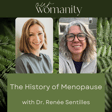
20. The Law and Menopause with Naomi R. Cahn & Emily Gold Waldman
September is Perimenopause Awareness Month! And we are diving into all things perimenopause and menopause.
How do policies and laws impact women’s rights during perimenopause and menopause in the workplace? In this episode of Our Womanity with Dr. Rachel Pope, we delve into this important issue with expert guests Naomi R. Cahn, the Justice Anthony M. Kennedy Distinguished Professor of Law, and the Nancy L. Buc '69 Research Professor in Democracy and Equity at the University of Virginia School of Law. Naomi is the author of numerous books, including Fair Shake (2024). Joining the conversation is Emily Gold Waldman, Associate Dean for Faculty Development and Professor of Law at the Elisabeth Haub School of Law at Pace University.
Along with Bridget J. Crawford, a University Distinguished Professor at the Elisabeth Haub School of Law at Pace University, who is the co-author, with Emily Gold Waldman, of Menstruation Matters (2022), among other publications, the three women recently published the book “Hot Flash How the Law Ignores Menopause and What We Can Do About It”, set out to replace the silence surrounding menopause with a deeper understanding.
Hot Flash explores the cultural stereotypes associated with menopause and examines how menopause is handled in both law and medicine. The book positions menopause as one of several key stages in a person’s reproductive life. Using U.S. legislation around pregnancy and breastfeeding as a framework, the authors propose updates to workplace policies and laws that would include menopause. Their work invites us to envision a legal landscape that promotes a more equitable future for all.
Order your copy of Hot Flash: How the Law Ignores Menopause and What We Can Do About It, available through Stanford University Press.
Featured in this episode:
- Millions of women are working during menopause, but US law isn’t clear on employees’ rights or employers’ obligations
- Menopause treatments can help with hot flashes and other symptoms – but many people aren’t aware of the latest advances
Follow us on social media:
- Instagram: @drrpope
- TikTok: @vulvadoctor
- Twitter: @drrpope
Want more from Our Womanity?
If you enjoyed this episode of Our Womanity, please subscribe, rate, and leave a review. Your feedback helps us continue to bring you engaging and empowering content.



















